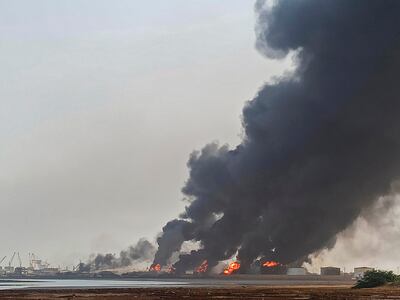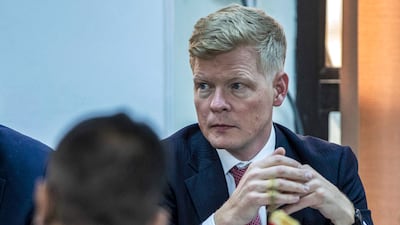Yemen's internationally recognised government and Houthi rebels agreed on Tuesday to de-escalate tension after Israel's recent attack on the port of Hodeidah, which has threatened to exacerbate one of the world's largest humanitarian crises.
The warring sides agreed to restore outstanding financial issues, said the office of the UN Special Envoy to Yemen, Hans Grundberg.
The government and the Houthis will cancel “all recent decisions and procedures against banks by both sides and refrain in the future from any similar decisions or procedures”, it said.
Yemenia flights will resume between the Yemeni capital Sanaa and Amman in Jordan. The number of flights will increase to three a day and daily flights to Cairo and India will also take place.
The two sides will meet “to address the administrative, technical and financial challenges" faced by the airline, said Mr Grundberg's office.
They will also “initiate the convening of meetings to discuss all economic and humanitarian issues based on the road map”, it added.
Later on Tuesday, Mr Grundberg, speaking at the UN Security Council, said the deal – which has been months in the making – is a "welcome" step, but deeper commitments are needed.
"Stop-gap measures might serve as band-aids but will not provide for sustainable solutions nor will they reasonably pave the way for a nationwide ceasefire and a political process without sustained dialogue," he said, urging direct negotiations between the warring parties.
The agreement follows the first Israeli strike on the Arabian Peninsula's poorest country that took place on Saturday. At least nine people were killed and dozens injured.
It was in response to a Houthi drone attack that breached Israel's air defences, killing one person in Tel Aviv the day before.
The Houthi attacks on Israel and Israeli retaliatory strikes on Hodeidah and its oil and power complexes on July 20 represent "a new and dangerous level" of violence, Mr Grundberg said.
The port of Hodeidah is Yemen's biggest entry point for fuel imports and international aid for rebel-held areas. The UN has said more than half of the Yemeni population relies on humanitarian assistance.
The Iran-backed Houthis, who are fighting Israel as part of a regional network of groups supported by Tehran, have pledged a "huge" response to the port strikes and threatened to attack Tel Aviv again.
Houthi attacks on commercial shipping started after Israel began its offensive on the Gaza Strip and have been undeterred by waves of US and UK strikes on Houthi positions in Yemen.
Mr Grundberg thanked Saudi Arabia for its "significant role in bringing this agreement about".
A Houthi delegation was in Riyadh a few days ago, local media reported.
The top UN official also expressed "the United Nations’ readiness to work with the parties to implement the measures they agreed", his office said.
Mr Grundberg stressed "the need for the parties to collaborate towards an economy that benefits all Yemenis and supports the implementation of a nationwide ceasefire and the resumption of an inclusive political process".

The agreement between Yemen's warring sides to address financial issues is "significant" and could be linked to the Israeli strike, Afrah Nasser, a non-resident fellow at the Arab Centre in Washington, told The National.
"There seems to be a connection between the agreement and the recent Israeli strike on the port of Hodeidah. The strike has exacerbated the already fragile situation in Yemen, since the port is a crucial entry point for fuel imports and aid," Ms Nasser said.
"The agreement to de-escalate tensions and address financial issues likely stems from the heightened threat of further conflict and the urgent need to avert a worsening humanitarian crisis.
"By agreeing to prevent financial and humanitarian deterioration, both sides are likely attempting to mitigate the impact of the Israeli strike and prevent further destabilisation."
However, the deal is "not a comprehensive solution to the country's staggering economic challenges," she said.
Ms Nasser said the resumption of flights will help ease the suffering of many Yemeni civilians who need urgent medical attention abroad.
Until April 2022, the airport had been closed due to nearly a decade of war between a Saudi-led coalition and the Houthi rebels who now control most of the country.
The Houthis ousted the government from Sanaa in late 2014, and have de facto control of north Yemen, including Sanaa.
Baraa Shiban, an associate fellow at the Rusi defence think tank and a Yemeni human rights activist, told The National that the Israeli attack had pushed Mr Grundberg into trying to secure a deal in case the situation spiralled out of control.
"The international approach towards the Houthis is changing, which means Mr Grundberg won't be able to make a deal with the Houthis, at least not as easy as he initially wanted," Mr Shiban said.
"More escalation with Israel or in the Red Sea makes it harder for the UN to broker an agreement."


